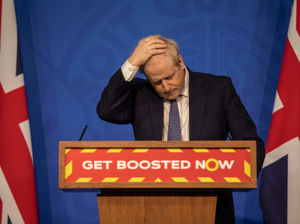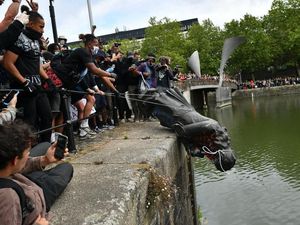Toby Neal: Can Boris find a way to stay high and dry?
Should Boris be toppled and thrown in the water?

When the character on the plinth has become an embarrassment, taking a tumble over the harbour wall starts to become a distinct possibility.
It is, after all, the fate of many a politician. They stand proudly over us. Then along comes an election and... splash!
Democracy, they call it.
A dunking is not inevitable. Some know that there is a right time to step down with dignity. Others get wrapped up in ermine. A few stay put and continue to be looked up to.
As it happens I am not aware of any statues to Boris, but if there are any plans for one a suitable location would be near a body of water to save on the travelling time.
Which brings me to Bristol and The Acquittal. In the unlikely event that you don't know what I'm talking about this is where some people you've never heard of pulled down a statue of somebody you probably had not previously heard of and mistreated same, but no crime was committed because they were on the right side of history.
One in the eye then for Henry Ford, who famously said that all history is more or less bunk. Not only is it not bunk, but being on the right side of it can determine whether you stand or fall.
The specific reasons why the jury reached their decision we don't know, as they are not allowed to say, but we can infer that they accepted the argument that the real criminal in the case was Edward Colston and he got what was coming to him.
I think that when the Bristolians of late Victorian times put up the Colston statue in the first place they imagined that they were putting up a "statue of a philanthropist" but in media reports it has been routinely described as a "statue of a slave trader."
Anyway, the jury's decision now means there is licence to purify our historical and cultural landscape of offending false icons, as Cromwell's men did in Ely Cathedral and other places, and if you can prove your targets are real bad 'uns you don't even have to go through any democratic process to do it.
You can simply give yourself permission.

I would though strongly advise against smashing up statues of Winston Churchill (which will perhaps soon be routinely described in the media as "statues of an imperialist") because even though he has his detractors (Tonypandy, etc), the consensus is that fighting genocidal fascism places him on the right side of history, so the jury would convict, it would be counted as vandalism, and you would probably go to jail.
I think my favourite true jury story is one in which the 12 good citizens retired to consider their verdict in a case heard at Shrewsbury Crown Court of three men who had denied stealing.
They mulled things over for an hour before returning with a question for the judge, Peter Northcote.
They asked: "How have they pleaded?"
Meanwhile in a speech in Birmingham this week Sir Keir Starmer offered a contract with the British people.
Great idea, would restore trust in British politics and all that. If he is serious about it, there is actually a way he could do that in a concrete manner. He could make the Labour manifesto at the next general election a binding legal document.
Sir Keir is a lawyer, so it wouldn't take too long to draw up such a solemn and binding agreement, and it would mean that if Sir Keir did not stick to his promises, he and senior Labour officials could be sued. Or maybe liable to prosecution for contract fraud.
Otherwise his contract will be that amorphous thing, a vague and waffly verbal contract.
Which brings to mind another famous quote, or rather misquote, this time by Sam Goldwyn: "A verbal contract isn't worth the paper it's written on."
By the way, with the cold snap of the last few days, please let me know how your electric cars are faring because I heard a programme on the radio the other day which gave some decidedly mixed reports.
If we're going to be forced to buy them, we may as well know if they are any good.





